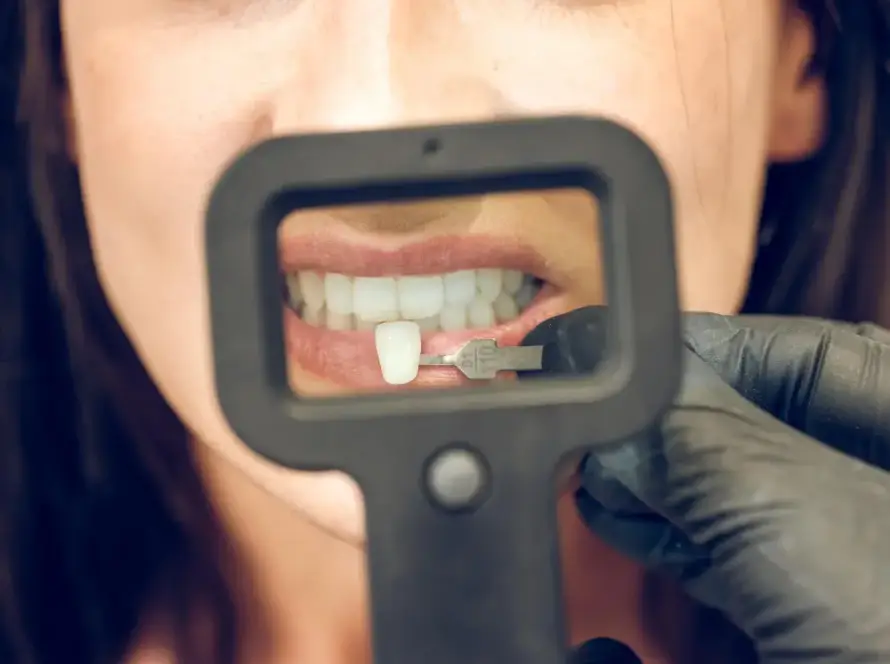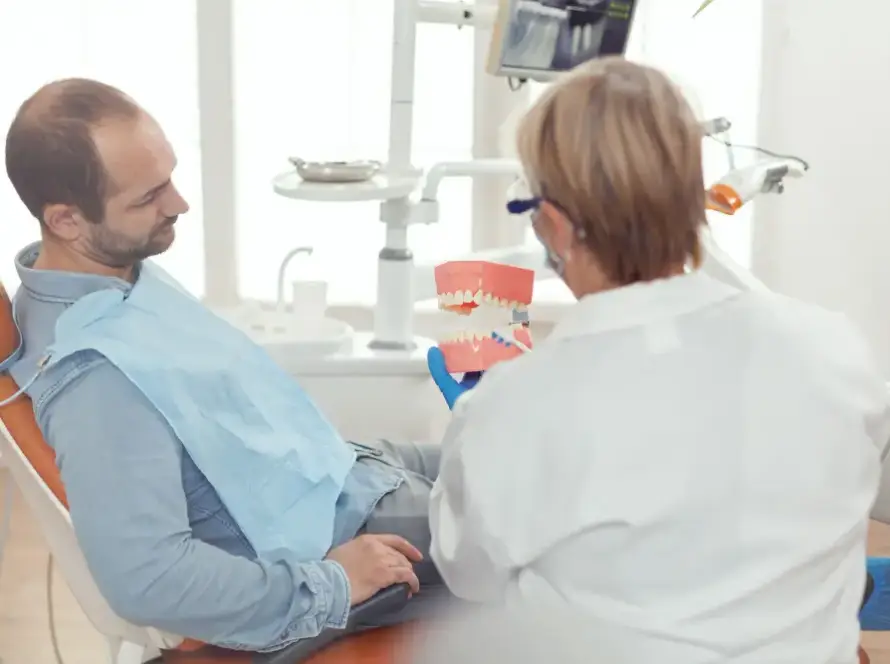Periodontal disease, also known as gum disease, is a common oral health condition that affects the gums and surrounding tissues. It is caused by the buildup of plaque and bacteria on the teeth, leading to inflammation and infection. If left untreated, periodontal disease can progress and result in tooth loss.
There are two main stages of periodontal disease: gingivitis and periodontitis. Gingivitis is the early stage, characterized by red, swollen, and bleeding gums. It is reversible with proper oral hygiene and professional dental care.
If gingivitis is not treated, it can progress to periodontitis. In this stage, the infection spreads below the gum line, causing the gums to pull away from the teeth and creating pockets. These pockets become infected and can lead to the destruction of the bone and ligaments that support the teeth. Without intervention, the teeth may become loose and eventually fall out.
Prevention and early detection play crucial roles in managing periodontal disease. Good oral hygiene practices such as regular brushing, flossing, and professional cleanings can help remove plaque and prevent gum disease. It is also essential to address risk factors such as smoking, diabetes, and genetic predisposition, as they can contribute to the development and progression of periodontal disease.
If diagnosed with periodontal disease, treatment options may include scaling and root planing, antibiotic therapy, and in severe cases, surgical procedures. The goal is to remove the infection, restore gum health, and prevent further damage.
Understanding the basics of periodontal disease is essential for maintaining optimal oral health. By taking preventive measures and seeking treatment in the early stages, individuals can significantly improve the longevity of their teeth and preserve a healthy smile.
How Long Can You Keep Your Teeth With Periodontal Disease?
When it comes to the longevity of teeth with periodontal disease, it is important to understand that each case is unique and can vary depending on several factors. However, with proper treatment and maintenance, it is possible to keep your teeth for a longer period.
- Early detection and treatment: The key to preserving teeth with periodontal disease is early detection and prompt treatment. Regular dental check ups and professional cleanings can help identify and address gum disease in its early stages, preventing further damage to the teeth and supporting structures.
- Personal oral hygiene: Good oral hygiene habits are crucial for managing periodontal disease. Brushing at least twice a day and flossing daily can help remove plaque and bacteria from the teeth and gumline. This can minimize the progression of the disease and prolong the life of your teeth.
- Professional intervention: In some cases, periodontal disease may require more intensive treatment, such as scaling and root planing, periodontal surgery, or antibiotic therapy. These interventions are aimed at controlling the disease and preserving the teeth, improving their chances of longevity.
- Lifestyle factors: Certain lifestyle choices can impact the progression of periodontal disease and the longevity of your teeth. Avoiding smoking or quitting if you already smoke can significantly improve treatment outcomes and increase the lifespan of your teeth.
- Ongoing maintenance: Once periodontal disease has been treated, it is essential to maintain a diligent oral hygiene routine and regularly visit your dentist for follow up appointments. This ongoing care can help monitor the disease’s progress and address any relapses promptly, ultimately extending the lifespan of your teeth.
While periodontal disease can have significant consequences, including tooth loss, adhering to proper oral hygiene practices, seeking professional intervention when necessary, and maintaining routine dental visits can contribute to keeping your teeth for a longer time. Remember, individual circumstances may vary, so it is crucial to consult with your dentist for personalized advice and treatment options.
The Relationship Between Periodontal Disease and Tooth Longevity
Periodontal disease, also known as gum disease, is a common oral health condition that affects the surrounding tissues and structures supporting the teeth. This condition is primarily caused by bacterial infection resulting from poor oral hygiene practices. If left untreated, periodontal disease can lead to tooth loss and significantly impact tooth longevity.
One of the main factors influencing the relationship between periodontal disease and tooth longevity is the destruction of the supporting structures of the tooth. As the disease progresses, bacteria accumulate in the periodontal pockets, leading to chronic inflammation and destruction of the gum tissue, periodontal ligament, and alveolar bone. This damage weakens the foundation of the tooth, making it more prone to mobility and eventual loss.
Additionally, periodontal disease can indirectly affect tooth longevity by increasing the risk of other oral health issues. The chronic inflammation associated with gum disease can contribute to the development of dental caries, tooth sensitivity, and even root canal infections. These conditions further compromise the health and longevity of the affected teeth.
Furthermore, studies have shown that periodontal disease is closely linked to systemic health conditions, such as cardiovascular disease, diabetes, and respiratory diseases. These systemic conditions can further impact tooth longevity by affecting overall oral health and healing capabilities.
In order to preserve tooth longevity in individuals with periodontal disease, prompt diagnosis and effective treatment are crucial. Early stages of gum disease can often be managed with improved oral hygiene practices, professional dental cleanings, and antimicrobial therapies. However, more severe cases may require advanced periodontal treatments, such as scaling and root planing, gum grafts, or even tooth extractions.
Regular dental check ups and routine cleanings are essential for monitoring the health of the gums and detecting periodontal disease at an early stage. Maintaining good oral hygiene habits, including regular and proper brushing and flossing, can also play a significant role in preventing the progression of gum disease.
Overall, the relationship between periodontal disease and tooth longevity is complex. Effective management of gum disease through early intervention and comprehensive treatment can improve the chances of preserving tooth longevity and overall oral health.
Factors That Impact the Longevity of Teeth with Periodontal Disease
The longevity of teeth with periodontal disease can be influenced by various factors. Understanding these factors is crucial in determining the prognosis and treatment options available for individuals dealing with this condition. Here are some key factors that can impact the longevity of teeth affected by periodontal disease:
- Severity of the Disease: The severity of periodontal disease plays a significant role in the lifespan of affected teeth. Advanced stages of periodontitis, such as periodontal pocket formation, bone loss, and gum recession, can greatly compromise the stability and longevity of teeth.
- Timeliness of Treatment: Early diagnosis and prompt treatment of periodontal disease can significantly improve the chances of tooth retention. Regular dental check ups can help detect signs of periodontal disease early on and enable timely intervention, preserving the affected teeth for a longer period.
- Oral Hygiene Practices: Proper oral hygiene practices are essential in managing periodontal disease and preserving the longevity of teeth. Regular brushing, flossing, and using antimicrobial mouth rinses can help control bacterial growth, reduce inflammation, and slow down the progression of periodontal disease.
- Systemic Health Conditions: Certain systemic health conditions such as diabetes, cardiovascular disease, and autoimmune disorders can impact the longevity of teeth with periodontal disease. Proper management of these underlying health conditions is crucial in minimizing the detrimental effects of periodontal disease on oral health.
- Smoking and Tobacco Use: Smoking and tobacco use are known to exacerbate the progression of periodontal disease and diminish the longevity of affected teeth. Quitting smoking and avoiding tobacco products can significantly improve the chances of preserving affected teeth.
- Genetic Factors: Genetic predisposition may play a role in determining the likelihood and severity of periodontal disease. Individuals with a family history of gum disease may be more susceptible to tooth loss. However, proactive oral hygiene practices and regular dental care can help mitigate the impact of genetic factors.
- Stress and Lifestyle Factors: Chronic stress, poor nutrition, and unhealthy lifestyle habits can compromise the body’s immune response and contribute to the progression of periodontal disease. Adopting a healthy lifestyle, managing stress, and ensuring a balanced diet can support overall oral health and improve tooth longevity.
Understanding these factors is integral in the comprehensive management of periodontal disease and the preservation of teeth. It is important to consult with a dental professional for an accurate diagnosis, personalized treatment plan, and guidance on maintaining optimal oral health. By addressing these factors proactively, individuals can increase the chances of retaining their teeth for a longer period despite the presence of periodontal disease.
The Role of Oral Hygiene in Preserving Tooth Longevity
Maintaining good oral hygiene practices is essential for preserving the longevity of teeth, especially in the presence of periodontal disease. Proper oral hygiene habits can help prevent or slow down the progression of this disease, reducing the risk of tooth loss.
Here are some key aspects of oral hygiene that play a vital role in preserving tooth longevity:
- Regular Brushing: Brushing the teeth at least twice a day with a soft bristled toothbrush and fluoride toothpaste is crucial. This helps remove plaque, a sticky film of bacteria that can cause gum inflammation and lead to periodontal disease.
- Flossing: Flossing daily is as important as brushing. It helps remove plaque and food particles between the teeth and along the gumline that a toothbrush may not reach.
- Using Mouthwash: Antimicrobial mouthwashes can help reduce the bacterial load and control gum inflammation. They are particularly beneficial for individuals with gum disease.
- Proper Technique: It is essential to use the correct brushing and flossing techniques to ensure effective cleaning. Dentists or dental hygienists can provide guidance on the proper technique.
- Regular Dental Check ups: Regular visits to the dentist allow for the early detection and management of periodontal disease. Dentists can monitor oral health, provide professional teeth cleanings, and offer personalized advice on maintaining oral hygiene.
- Professional Teeth Cleanings: Professional teeth cleanings, also known as dental prophylaxis, remove tartar buildup that cannot be eliminated with regular brushing and flossing. This helps prevent the progression of periodontal disease.
- Lifestyle Factors: Maintaining a healthy lifestyle can also contribute to tooth longevity. Avoiding tobacco products, limiting alcohol consumption, and following a balanced diet rich in fruits and vegetables can all help support overall oral health.
Remember, oral hygiene is an ongoing commitment that needs to be incorporated into daily routines. By adopting good oral hygiene practices and seeking professional dental care, individuals can play an active role in preserving the longevity of their teeth, even in the presence of periodontal disease.
Understanding the Importance of Regular Dental Visits
Regular dental visits play a crucial role in maintaining oral health and preventing the progression of periodontal disease. These visits provide an opportunity for professional evaluation, early detection of problems, and timely intervention.
- Early Detection and Prevention:
- Dental professionals can detect early signs of gum disease, cavities, and other dental issues during routine check ups.
- Through thorough examinations, they can identify potential risk factors and provide guidance on effective preventive measures.
- Professional Cleaning:
- Regular dental visits include professional cleaning, which helps remove plaque, tartar buildup, and bacterial infections that can contribute to gum disease.
- These cleanings improve oral hygiene, reduce inflammation, and prevent further damage to the gums and teeth.
- Individualized Treatment:
- Dental professionals can develop personalized treatment plans to address specific oral health concerns.
- They can provide guidance on proper oral hygiene techniques, recommend appropriate dental products, and offer preventive treatments (such as fluoride applications or dental sealants).
- Education and Awareness:
- Regular dental visits offer an opportunity to educate patients about the importance of oral health and the impact of periodontal disease on overall well being.
- Dental professionals can provide tips for maintaining good oral hygiene practices at home, including proper brushing and flossing techniques.
- Early Intervention and Improved Outcomes:
- By visiting the dentist regularly, potential issues can be caught early, leading to more successful treatment outcomes.
- Prompt treatment of periodontal disease can halt its progression, preventing gum recession, tooth loss, and potential systemic health complications.
Regular dental visits are a proactive approach to maintaining optimal oral health. By understanding the significance of these visits, individuals can take control of their oral hygiene and prevent the negative consequences of periodontal disease.
Myths and Facts About Tooth Longevity with Periodontal Disease
When it comes to the longevity of teeth with periodontal disease, there are several myths and misconceptions that need to be addressed. Understanding the facts is essential for maintaining good oral health. Let’s explore some common myths and the corresponding facts about tooth longevity with periodontal disease:
- Myth: Once you have periodontal disease, you will inevitably lose all your teeth.
Fact: While periodontal disease can lead to tooth loss if left untreated, it doesn’t mean that all teeth will be lost. With proper treatment and good oral hygiene practices, the progression of the disease can be slowed down, and tooth loss can be prevented.
- Myth: Losing a few teeth is not a big deal; you can always get dentures.
Fact: Losing natural teeth can have significant implications for both oral health and overall well being. Dentures may provide a replacement for missing teeth but can never fully replicate the function and feel of natural teeth. Preserving natural teeth through proper periodontal care is always the best option.
- Myth: Brushing and flossing won’t make much of a difference once you have periodontal disease.
Fact: Brushing and flossing remain crucial even if you have periodontal disease. These practices help remove plaque and bacteria, reducing the risk of further damage caused by the disease. Regular oral hygiene routines, along with professional dental cleanings, can help manage periodontal disease.
- Myth: Once you have periodontal disease, it cannot be cured.
Fact: While periodontal disease is a chronic condition, it can be managed and treated. Early diagnosis and intervention play a significant role in controlling the disease’s progression. Dentists and periodontists can provide various treatments and suggest lifestyle changes to manage the condition effectively.
- Myth: Periodontal disease only affects older adults.
Fact: Periodontal disease can affect people of all ages, including children and adolescents. The disease is often caused by poor oral hygiene practices, hormonal changes, certain medical conditions, and genetic factors. Regular dental check ups are important for early detection and timely intervention.
By debunking these myths and understanding the facts, individuals with periodontal disease can take proactive steps to preserve their teeth. Seeking professional dental care, maintaining excellent oral hygiene, and adopting a healthy lifestyle are essential for improving the longevity of teeth with periodontal disease.















